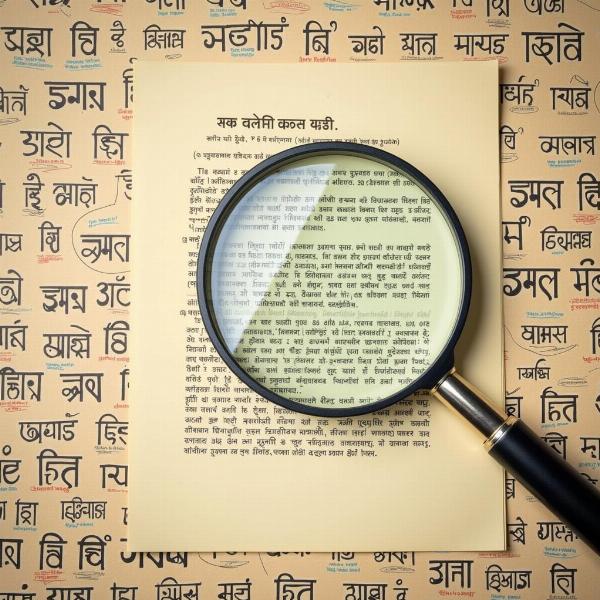Fault finding, a common human tendency, translates to various shades of meaning in Hindi. Understanding these nuances is essential for effective communication and navigating social situations. Whether you’re discussing technical issues, personal relationships, or workplace dynamics, knowing the right Hindi equivalent for “fault finding” can greatly enhance your understanding. This article explores the various Hindi translations, their contextual usage, and the cultural implications associated with this concept.
Different Ways to Express “Fault Finding” in Hindi
Several Hindi words and phrases capture the essence of “fault finding,” each with its own subtle connotations. Here are some of the most common translations:
- दोष ढूँढ़ना (dosh dhundhna): This is a literal translation, meaning “to search for faults.” It is a general term and can be used in various contexts.
- नुक़्स निकालना (nuqs nikalna): This phrase implies picking out flaws or imperfections, often with a negative connotation, suggesting nitpicking or unnecessary criticism.
- कमी निकालना (kami nikalna): Similar to nuqs nikalna, this emphasizes finding shortcomings or deficiencies. It suggests a focus on what’s lacking rather than appreciating the positive aspects.
- ऐब निकालना (aib nikalna): This implies finding defects or flaws, often in a person’s character or behavior. It carries a stronger negative connotation than dosh dhundhna.
- गलती ढूँढ़ना (galti dhundhna): This translates to “searching for mistakes” and is often used in a more formal or professional context, such as reviewing a document or analyzing a process.
 Fault Finding Meaning in Hindi: Exploring Different Nuances
Fault Finding Meaning in Hindi: Exploring Different Nuances
Contextual Usage and Cultural Implications
The appropriate Hindi translation for “fault finding” depends heavily on the context. In a professional setting, galti dhundhna or dosh dhundhna might be suitable. However, in personal relationships, using nuqs nikalna or aib nikalna could be perceived as overly critical or even insulting. Indian culture often emphasizes politeness and avoiding direct confrontation. Therefore, expressing criticism, even constructive criticism, requires sensitivity and tact.
How to Express Fault Finding Politely in Hindi
When offering constructive criticism, focusing on the issue rather than the person is crucial. Phrases like “मुझे लगता है कि इसमें थोड़ा सुधार हो सकता है (mujhe lagta hai ki ismein thoda sudhaar ho sakta hai)” – meaning “I think there’s room for improvement here” – are more diplomatic than directly pointing out flaws. Using softer language and focusing on solutions can help maintain positive relationships while addressing necessary improvements.
Fault Finding in Different Spheres of Life
- Workplace: In a professional setting, focusing on process improvement and constructive feedback is essential. Using terms like galti dhundhna or dosh dhundhna and offering specific suggestions for improvement are preferable.
- Family: Fault finding within families can be delicate. Open communication and respectful language are crucial. Focusing on solutions and avoiding accusatory tones can help maintain harmony.
- Friendships: Similar to family dynamics, handling criticism among friends requires sensitivity. Using humor and lightheartedness can diffuse tension while addressing concerns.
Choosing the Right Word: A Quick Guide
- Formal: dosh dhundhna, galti dhundhna
- Informal: kami nikalna, nuqs nikalna
- Negative: aib nikalna
Conclusion
Understanding the nuances of “fault finding meaning in hindi” is crucial for navigating various social and professional situations. By choosing the appropriate word or phrase and expressing criticism constructively, you can foster positive communication and build stronger relationships.
FAQ
- What is the most common Hindi translation for “fault finding”? Dosh dhundhna is a commonly used and relatively neutral term.
- Is aib nikalna considered rude? Yes, aib nikalna carries a strong negative connotation and can be perceived as rude or insulting.
- How can I express criticism politely in Hindi? Focus on the issue rather than the person and use softer language.
- What is the difference between nuqs nikalna and kami nikalna? Both are similar, but nuqs nikalna often implies nitpicking, while kami nikalna focuses on deficiencies.
- Which term is appropriate for professional settings? Galti dhundhna or dosh dhundhna are suitable for professional contexts.
- Why is understanding the context important when translating “fault finding”? The appropriate translation depends heavily on the context and the relationship between the individuals involved.
- How can I avoid sounding overly critical when expressing concerns in Hindi? Frame your concerns as suggestions for improvement and focus on solutions rather than simply pointing out flaws.
Meaning-Hindi.in specializes in providing accurate and culturally sensitive translation services across various domains, including business, legal, technical, and educational content. Our expertise in Hindi linguistics and Indian culture ensures that your message is conveyed effectively and respectfully. Need help with your Hindi translation needs? Contact us at [email protected] or call us at +91 11-4502-7584. Meaning-Hindi.in is your trusted partner for all your Hindi language solutions.